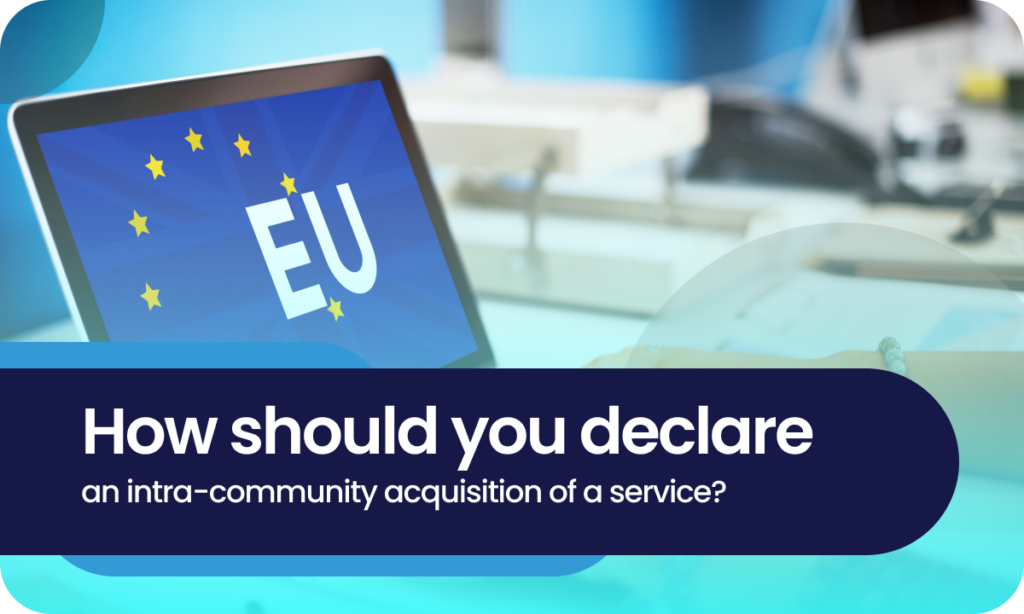
Intra-Community acquisitions of services play a crucial role in trade between European Union countries. If you are an entrepreneur in Spain and carry out these types of transactions, it is essential to understand how to declare them correctly. Below, we will guide you through the key steps to comply with the tax obligations involved in an intra-community acquisition. Read on to learn more and ensure a smooth tax management, let’s get to it!
What does the term “intra-community operations” imply?
Intra-EU transactions cover commercial transactions between different countries of the European Union. This may include both:
- Situations where the parties involved are in different EU countries. As in the case of services.
- When goods are physically moved from one EU country to another.
You may also be interested in: What is an intra-community VAT number?
Categories of intra-community transactions
The EU’s main objective is to create a single market. One in which companies can trade freely without barriers and obstacles. Intra-EU transaction categories allow companies to conduct business transactions in a seamless manner, such as an intra-EU purchase.
By using specific categories for operations, documentation and administrative procedures are simplified. This streamlines the process and facilitates trade between companies from different EU countries.
That said, the different types of intra-community operations include:
Intracommunity supply of goods
This occurs when the goods sold are physically transferred to another EU country.
For example, company ‘A’ in France sells goods to company ‘B’ in Germany. The physical movement of the goods from France to Germany establishes that the transaction is considered an intra-Community sale from France, provided that the customer provides. If the intra-EU delivery of goods is B2C, it is commonly referred to as ‘intra-EU distance selling’.
Intra-community acquisition of goods
Represents the counterpart of the previous operation, in which goods purchased from another EU country are transported.
Provision of intra-community services
Occurs when a company provides services to other EU countries. For example, company ‘A’, based in Spain, provides legal advisory services to company ‘B’, based in Italy. These services are often referred to as EU B2B services or services that follow the general localization rules.
There are several exceptions to these rules on the location of the service, therefore, it is advisable to seek advice on the proper VAT treatment of these supplies.
Intra-community acquisition of services
This category corresponds to the counterpart of the previous transaction, where a company receives services from a supplier established in another EU country.
In order to be considered an intra-community acquisition of services, the following requirements must be met:
- Existence of two companies registered in different EU countries.
- Provision of a service by a company to a business customer in another EU country.
- The business customer must be registered for Value Added Tax (VAT) purposes in your country and have a valid tax identification number.
- The service is for commercial purposes and not for personal use.
You may also be interested in: What is the NIF in Spain and how to obtain it?
What is the process for reporting intra-community transactions?
Both intra-Community supply and purchase transactions, for both goods and services, must be included in the company’s VAT return. Depending on the country, it is likely that the VAT return will include specific boxes for these types of transactions.
Addionally, the intra-Community delivery of goods and the provision of services also need to be reported by filing Form 349 in Spain, which constitutes an information obligation.
In some countries, intra-Community acquisitions must also be declared. In these cases, the recapitulative declaration is mandatory when intra-Community acquisitions of goods and services are made.
This practice is required in countries such as Spain, Poland or Hungary, and is known as the European Sales and Purchase List (EC Sales List).
Finally, if the intra-Community transactions carried out during a calendar year exceed the corresponding thresholds, it may also be compulsory to file the Intrastat declaration. These thresholds vary from country to country and are usually differentiated for dispatch and arrival flows.
The Intrastat declaration is a statistical report sent to the customs and statistical authorities and includes more detailed information than the recapitulative declaration of intra-Community operations.
Follow the step-by-step more precisely below:

Intra-community VAT implications in an intra-community acquisition
When B2B intra-Community acquisitions of goods and services are made, the reverse-charge mechanism is triggered. Thus, it will be necessary to settle the VAT corresponding to such transaction in your VAT return.
Certain countries, it is essential to integrate these transactions in the summary declaration of intra-Community transactions. Also, the transaction will be reported in the Intrastat declaration if the income flow is being reported.
You may also be interested in: How to invoice foreign customers from Spain?
The correct declaration of intra-community acquisitions is vital for the success and legality of your business in Spain. If you need personalized and accurate guidance in this aspect, do not hesitate to contact us through tasconsultoria@tas-sl.es and schedule your personalized advice. Our team of tax and accounting experts is ready to help you.
Request a specialized consultation and ensure an optimal handling of your commercial transactions, such as an intra-community acquisition. Don’t wait any longer, your tax compliance is our priority!




Your email address will not be published .
Required fields are marked with *